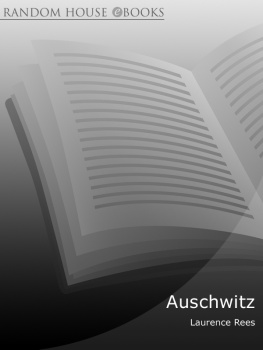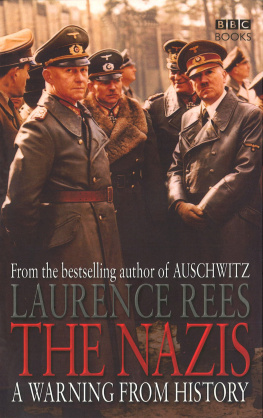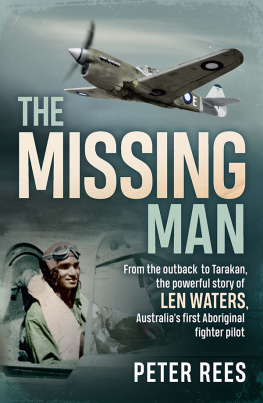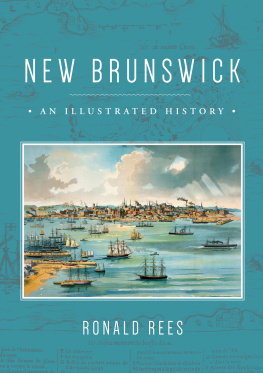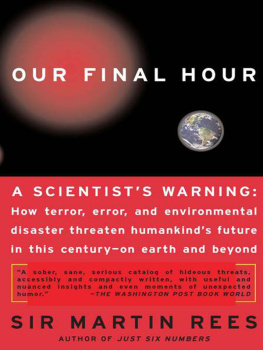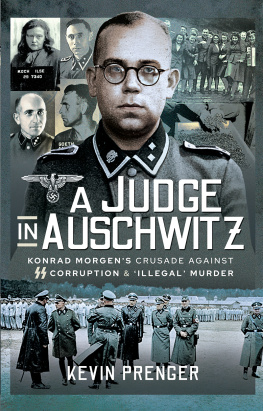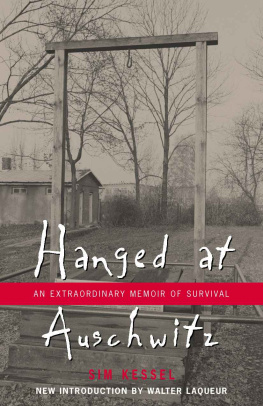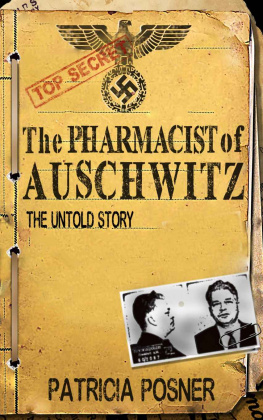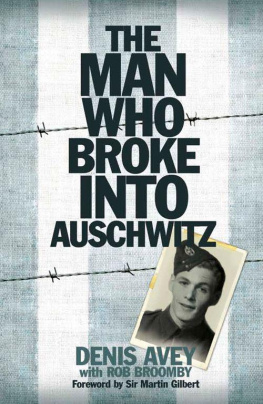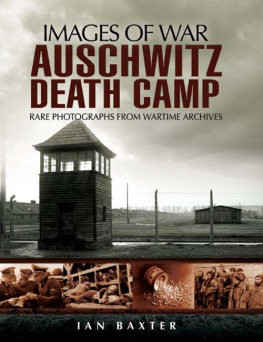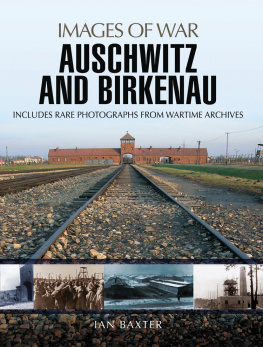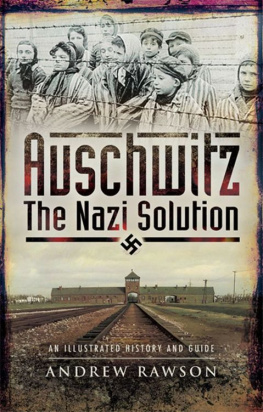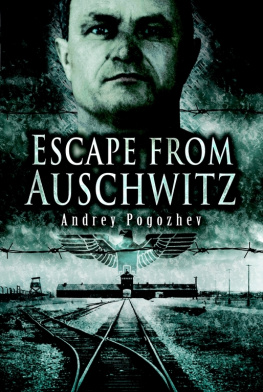CONTENTS
About the Author
Laurence Rees is Creative Director of History Programmes for BBC Television and a former editor of the Emmy-winning Timewatch, BBC TVs history documentary series.
He has written five previous books, including The Nazis: a Warning from History (BBC Books 1997), War of the Century about the Hitler/Stalin war (BBC Books 1999) and Horror in the East (BBC Books 2000), an examination of the war against Japan. The Nazis: a Warning from History, War of the Century and Horror in the East were also successful television documentary series all written and produced by Laurence Rees. This body of work has won him a host of awards, including an International Documentary Association Award and a British Academy Award.
The Times has described Laurence as Britains most distinguished producer of historical documentaries, and in 2005 he was awarded an honorary doctorate from the University of Sheffield for services to history and television. He was educated at Solihull School and Oxford University.
In memory of 1.1 million men,
women and children
who died at Auschwitz
Praise for Auschwitz
An important contribution to our understanding of the Second World War Reess great urge to comprehend the mentality of the SS camp administrators and guards is fired not just by a passionate curiosity, but by an intellectual honesty that the subject badly needs.
Anthony Beevor, author of Stalingrad and Berlin, the Downfall 1945
A history of Auschwitz that is accessible and authoritative Rees does not shy away from the hard questions about human behaviour in extremis and his unobtrusive moral reflections make this not only a useful but a necessary book.
Professor David Cesarani, author of Eichmann: His Life and Crimes
Laurence Rees casts new light on how Auschwitz was created and developed into the ultimate place of horror, the lasting symbol of Nazi inhumanity. This admirable book deserves to be widely read.
Professor Ian Kershaw, author of Hitler, 18891936: Hubris and Hitler, 19361945: Nemesis
Highly compelling. This pathbreaking work reveals the destructive dynamism of the Nazis most notorious death camp. Rees consistently offers new insights He gives a vivid portrait of the behind-the-scenes workings of the camp.
Publishing Week
Half the British population, apparently, have never heard of Auschwitz. Some of the other half think that there is nothing left to say about it. But Laurence Rees shows that there is a great deal left to discover. Some of this comes from his admirable hunt for witnesses, both survivors and SS perpetrators Rees has spent years patiently coaxing them to talk as the end of their life approaches.
Neal Ascherson, Observer
Scrupulous and honest, this book is utterly without illusions Rees, a distinguished journalist and historian at the BBC, layers these details with little fanfare but great craftsmanship Reading this book is an ordeal not through any failure of the authors but because of his success Reess research is impeccable and intrepid. Rees also makes good use of the records that became available only after the collapse of the Soviet Union and its satellites spare, heartbreaking prose.
David Von Drehle, Washington Post
[an] excellent history of Auschwitz. By his patient accumulation of evidence, Rees seeks to refute Himmlers cynical pledge that the destruction of Jews was to be an unwritten page of glory. Rees disproves the common notion that Auschwitz staff were uniformly sadists.
Ian Thomson, Guardian
Laurence Reess work is as compelling and intensely moving as the BBC series it accompanies this heartrending and passionate book.
The Tribune
INTRODUCTION
THERE IS MUCH in this book that is upsetting, but I still think it is a necessary piece of work. Not just for the obvious reason that surveys still show that there is confusion in the popular consciousness about the true history of Auschwitz, but also because I hope it offers something distinctive.
It is the culmination of 15 years of writing books and making television programmes about the Nazis, and is an attempt to show how one of the worst crimes in history is best understood through the prism of one physical place: Auschwitz. Unlike the history of anti-Semitism, Auschwitz has one certain beginning (the first Polish prisoners arrived on 14 June 1940), and unlike the history of genocide, it has one definite end (the camp was liberated on 27 January 1945). In between these two dates Auschwitz had a complex and surprising history that in many ways mirrored the intricacies of Nazi racial and ethnic policy. It was never conceived as a camp to kill Jews, it was never solely concerned with the Final Solution though that came to dominate the place and it was always physically changing, often in response to the constant shifts in fortunes of the German war effort elsewhere. Auschwitz, through its destructive dynamism, was the physical embodiment of the fundamental values of the Nazi state.
The study of Auschwitz also offers us something other than an insight into the Nazis; it gives us the chance to understand how human beings behaved in some of the most extreme conditions in history. From this story there is a great deal we can learn about ourselves.
This is a book based on unique research around 100 specially conducted interviews with former Nazi perpetrators and survivors from the camp and draws on hundreds more interviews conducted for my previous work on the Third Reich, many with former members of the Nazi party. The benefit of meeting and questioning survivors and perpetrators is immense. It offers an opportunity for a level of insight that is rarely available from written sources alone. Indeed, although since my school days I had always been interested in this period of history, I can trace my own deep fascination with the Third Reich to one moment during a conversation with a former member of the Nazi party back in 1990. While writing and producing a film about Dr Josef Goebbels, I talked to Wilfred von Oven who, as his personal attach, had worked closely with the infamous Nazi propaganda minister. After the formal interview, over a cup of tea, I asked this intelligent and charming man: If you could sum up your experience of the Third Reich in just one word, what would it be? As Herr von Oven thought for a moment and considered the question, I guessed his response would make reference to the horrible crimes of the regime crimes he freely admitted had occurred and of the damage Nazism had wreaked upon the world. Well, he finally said, if I was asked to sum up my experience of the Third Reich in one word, that word would be Paradise.
Paradise? That didnt coincide with anything I had read in my history books. Nor did it square with the elegant, sophisticated man who sat in front of me, who did not, come to that, look or talk as I had imagined a former Nazi should. But Paradise? How was it possible that he could say such a thing? How could any intelligent person think of the Third Reich and its atrocities in such a way? Indeed, how was it possible that during the twentieth century people from Germany, a cultured nation at the heart of Europe, had ever perpetrated such crimes? Those were the questions that formed in my mind that afternoon all those years ago, and that still sit heavily in my mind today.
Next page
